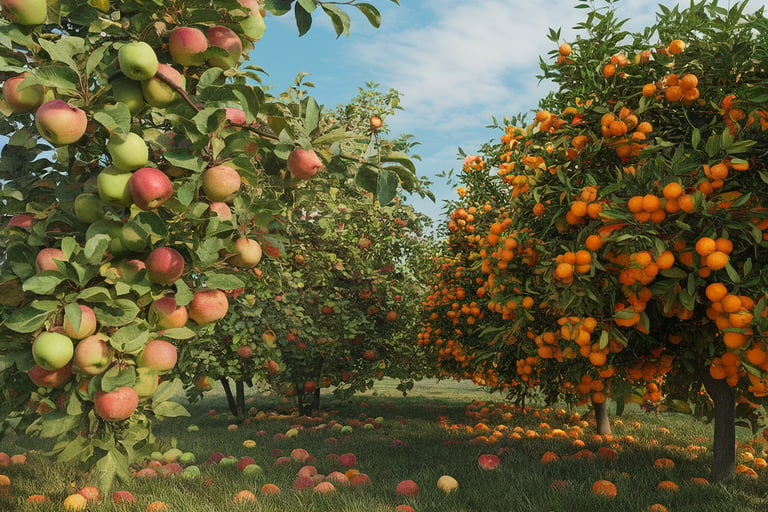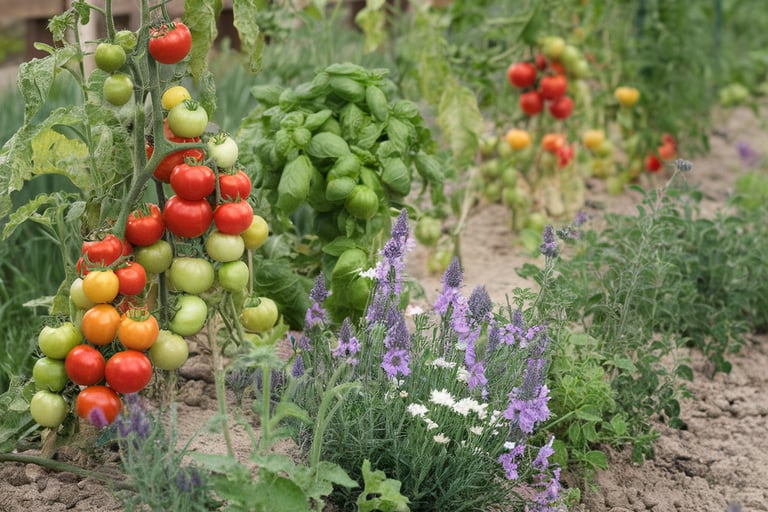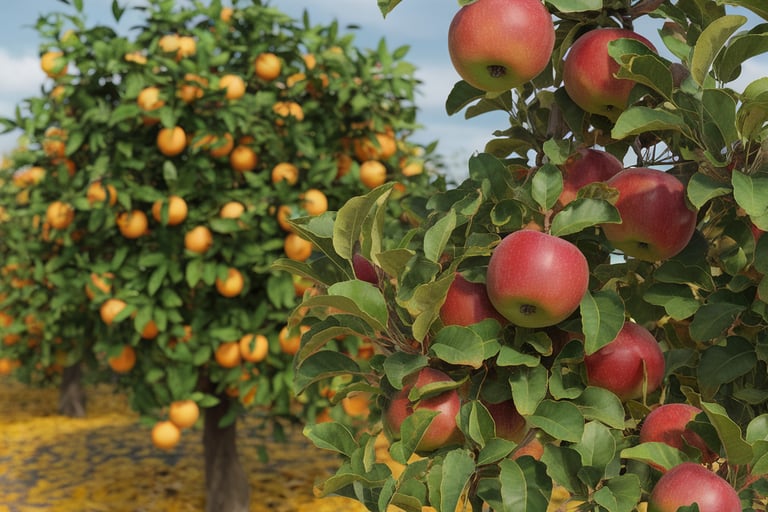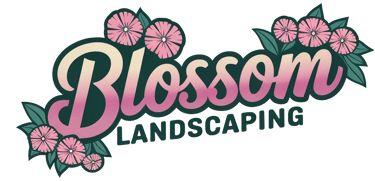
Edible Landscaping: Growing Food in Your Vancouver Garden - A Complete Guide
12/23/20246 min read
Growing your own food in Vancouver isn't just a trend – it's becoming a necessity for many homeowners looking to create sustainable, beautiful, and productive landscapes. Edible landscaping in Vancouver presents unique opportunities and challenges due to our distinct coastal climate and growing conditions. This comprehensive guide will help you transform your ordinary garden into a thriving edible landscape that's both functional and aesthetically pleasing.
Understanding Vancouver's Growing Climate
Before diving into edible landscaping, it's crucial to understand Vancouver's unique growing environment. Located in Plant Hardiness Zone 8a-8b, our city enjoys relatively mild winters and cool summers. According to Environment Canada's climate data, Vancouver experiences approximately 166 frost-free days annually, with an average growing season from March to November. This extended season, combined with adequate rainfall and moderate temperatures, creates ideal conditions for many edible plants.
The West Coast Challenge
Vancouver's maritime climate presents both advantages and challenges for edible landscaping. While our mild temperatures allow for extended growing seasons, the high rainfall (averaging 1,189 mm annually according to Vancouver Weather Stats) means we need to pay special attention to drainage and disease prevention. Working with local experts like the UBC Botanical Garden can provide valuable insights into managing these conditions effectively.
Planning Your Edible Landscape
The key to successful edible landscaping in Vancouver starts with thoughtful planning. Consider consulting with local experts at organizations like West Coast Seeds or visiting the VanDusen Botanical Garden for inspiration. Your edible landscape should integrate seamlessly with your existing garden while maximizing growing space and sunlight exposure.
Site Assessment and Preparation
Begin by analyzing your property's specific conditions:
Sunlight Patterns: Track sun exposure throughout the day. Most edible plants require 6-8 hours of direct sunlight. Vancouver's northern latitude means we need to be strategic about plant placement, especially in gardens with tall trees or buildings nearby.
Soil Quality: Vancouver's native soil tends to be acidic, with a pH typically ranging from 4.5-6.0. Contact the BC Society of Soil Science for professional soil testing services. Most edible plants prefer slightly acidic to neutral soil (pH 6.0-7.0), so you may need to amend your soil accordingly.
Drainage: Our wet winters make proper drainage essential. Consider working with local landscape professionals like Green City Builders or West Coast Lawns and Gardens to install appropriate drainage solutions if needed.
Municipal Guidelines and Regulations
Vancouver has specific guidelines for urban agriculture and edible landscaping. Before starting your project, familiarize yourself with:
The Vancouver Food Strategy guidelines
Local water conservation bylaws
Front yard landscaping regulations
Height restrictions for structures like trellises
You can find detailed information about these regulations on the City of Vancouver's website or consult with their planning department directly.
Choosing the Right Plants
When selecting plants for your Vancouver edible landscape, consider both aesthetic appeal and growing requirements. Some proven performers in our climate include:
Perennial Edibles
Herbs like rosemary, thyme, and sage thrive in Vancouver's climate and provide year-round interest. Local nurseries like Figaro's Garden in Vancouver specialize in herb varieties suited to our growing conditions.
Fruit Trees
Despite our urban setting, many fruit trees flourish in Vancouver. The Vancouver Fruit Tree Project recommends disease-resistant varieties like:
Liberty or Honeycrisp apples
Italian prune plums
Stella cherries
These varieties are well-adapted to our climate and require minimal spraying.
Seasonal Growing Strategies
Spring Planning (March-May)
Vancouver's spring brings abundant rainfall and gradually warming temperatures, making it ideal for establishing new edible landscapes. According to the Pacific Northwest Garden Guide, March is the perfect time to start cool-season crops. The UBC Farm recommends beginning with hardy greens like kale, Swiss chard, and spinach, which can withstand our spring temperature fluctuations.
Early spring is also the optimal time to establish fruit trees and berry bushes. Local supplier NATS Nursery offers a wide selection of fruit trees specifically chosen for Vancouver's climate. Consider installing espalier fruit trees along fences or walls to maximize space while creating visual interest.
Summer Cultivation (June-August)
During Vancouver's moderate summers, focus on heat-loving crops that can thrive in our unique microclimate. The Vancouver Farmers Markets demonstrate that successful summer crops include:
Water Management
Despite our rainy reputation, Vancouver summers can be surprisingly dry. Install a rainwater harvesting system to comply with Metro Vancouver's water conservation guidelines. Consider connecting with local irrigation specialists like Vancouver Irrigation for efficient watering solutions.
Fall Focus (September-November)
Fall in Vancouver offers extended growing opportunities. According to West Coast Seeds, September is ideal for planting overwintering crops like garlic and broad beans. The mild autumn allows for second plantings of quick-growing vegetables like radishes and lettuce.
Winter Protection Strategies
Our wet winters require careful planning to protect edible landscapes. Install clear polycarbonate covers over sensitive plants to prevent waterlogging while maintaining light exposure. Local garden centers like GardenWorks offer specialized winter protection materials suited to Vancouver's climate.
Design Integration
Creating Year-Round Visual Interest
Work with local landscape designers like Botanica Design to ensure your edible landscape remains attractive throughout Vancouver's seasons. Consider incorporating:
Structural Elements
Install raised beds using cedar, a locally sourced material known for its durability in our wet climate. The Vancouver Tool Library offers resources and workshops for DIY construction projects.
Companion Planting
Integrate ornamental flowers with edibles to support beneficial insects and create visual appeal. The Vancouver Master Gardeners Association recommends combining edibles with native flowering plants to enhance biodiversity and garden health.
Maintenance and Care
Soil Management
Vancouver's acidic soil requires regular amendment. Apply dolomite lime in fall, following recommendations from the BC Agriculture Council. Incorporate locally produced compost from City of Vancouver Green Bin Program to improve soil structure.
Pest Management
Our mild climate can harbor various pests. Work with Environmental Youth Alliance to learn about organic pest control methods suitable for edible landscapes. Implement companion planting strategies and encourage beneficial insects through thoughtful plant selection.
Harvesting and Food Safety
Optimal Harvesting Practices
Understanding Vancouver's unique climate patterns is crucial for maximizing harvest potential. The Vancouver Food Policy Council provides guidelines for harvesting different crops throughout our extended growing season. For example, root vegetables can often remain in the ground longer due to our mild winters, while fruits should be harvested promptly to prevent rot in our wet climate.
Food Safety Considerations
The BC Centre for Disease Control recommends specific food safety practices for urban gardeners. When growing edibles in Vancouver's urban environment, consider:
Soil Testing
Regular soil testing is essential, particularly in older Vancouver neighborhoods where soil may contain historical contaminants. The Environmental Lab at BCIT offers comprehensive soil testing services specifically for urban gardeners.
Water Quality
While Vancouver boasts some of the cleanest municipal water in North America, installing a water filter for your irrigation system can help remove any chlorine that might affect sensitive plants. Consult with RainCity Housing for sustainable water management solutions.
Community Resources and Support
Local Education Opportunities
Vancouver offers numerous resources for edible landscape enthusiasts:
The City Farmer organization provides regular workshops on urban agriculture techniques specific to Vancouver's growing conditions. Their demonstration garden in Kitsilano showcases successful edible landscaping strategies adapted to our local climate.
Village Vancouver hosts seasonal workshops on food growing and preservation techniques, helping residents maximize their edible landscapes throughout the year.
Networking and Knowledge Sharing
Connect with local food growing communities through:
The Vancouver Urban Farming Society, which offers mentorship programs and networking opportunities for urban gardeners.
Can You Dig It, a community program that provides resources and support for establishing edible gardens in Vancouver.
Seasonal Maintenance Calendar
Winter (December-February)
Plan next season's layout using West Coast Seeds planting calendar
Maintain winter crops under protection
Prune fruit trees during dormancy
Order seeds from local suppliers like Salt Spring Seeds
Spring (March-May)
Begin succession planting of cool-season crops
Install irrigation systems before the dry season
Apply organic fertilizers available from Environmental Youth Alliance
Start warm-season seedlings indoors
Summer (June-August)
Implement water conservation strategies
Monitor for pests common to Vancouver gardens
Continue succession planting for fall harvests
Maintain vertical growing structures
Fall (September-November)
Plant overwintering crops
Apply winter protection measures
Collect seeds for next season
Prepare soil for spring planting
Future Trends in Vancouver Edible Landscaping
Climate Adaptation
As Vancouver's climate continues to change, adapting edible landscapes becomes increasingly important. The Pacific Climate Impacts Consortium provides valuable insights into future growing conditions and recommended adaptations.
Sustainable Practices
Incorporate emerging sustainable practices such as:
Biochar soil amendments from local producers
Smart irrigation systems that respond to weather conditions
Integration of native edible plants recommended by Native Plant Society of BC
Transform your Vancouver garden into a productive edible landscape by starting with these steps:
Contact local experts for site assessment
Develop a seasonal planting calendar
Join community gardening groups
Schedule a consultation with professional landscapers
FAQ Section
Q: When is the best time to start an edible landscape in Vancouver?
A: Early spring (March-April) is ideal for beginning most edible landscaping projects in Vancouver, allowing plants to establish before summer.
Q: How much maintenance does an edible landscape require in Vancouver?
A: Expect to spend 4-6 hours weekly during peak growing season (May-September), with reduced maintenance in winter months.
Q: Can I grow food year-round in Vancouver?
A: Yes, with proper planning and protection methods, you can grow various crops throughout Vancouver's mild climate year-round.
Q: What are the best fruit trees for Vancouver's climate?
A: Apple, plum, and cherry trees specifically bred for coastal conditions perform well, particularly disease-resistant varieties.
Q: How do I protect my edible landscape during Vancouver's wet winters?
A: Use raised beds, proper drainage systems, and protective covers while choosing weather-resistant varieties suited to our climate.
For more information about edible landscaping in Vancouver or to schedule a consultation, visit our website or contact local gardening organizations mentioned throughout this guide.






Contact
Blossomscaping@gmail.com
+1-604-339-9217
© 2024. All rights reserved.
Where we service
3158 W 34th Ave, Vancouver, BC V6N 2S2
UBC - Cambie - Dunbar - West Vancouver - North Vancouver - West Point Grey - Shaughnessey - Richmond - Kerrisdale - South Vancouver - East Vancouver - Kitsilano - Burnaby - Mount Pleasant - Oakridge - Arbutus Ridge - Marpole - Southlands - Victoria-Fraserview


Proudly Servicing Vancouver, British Columbia
What we service
